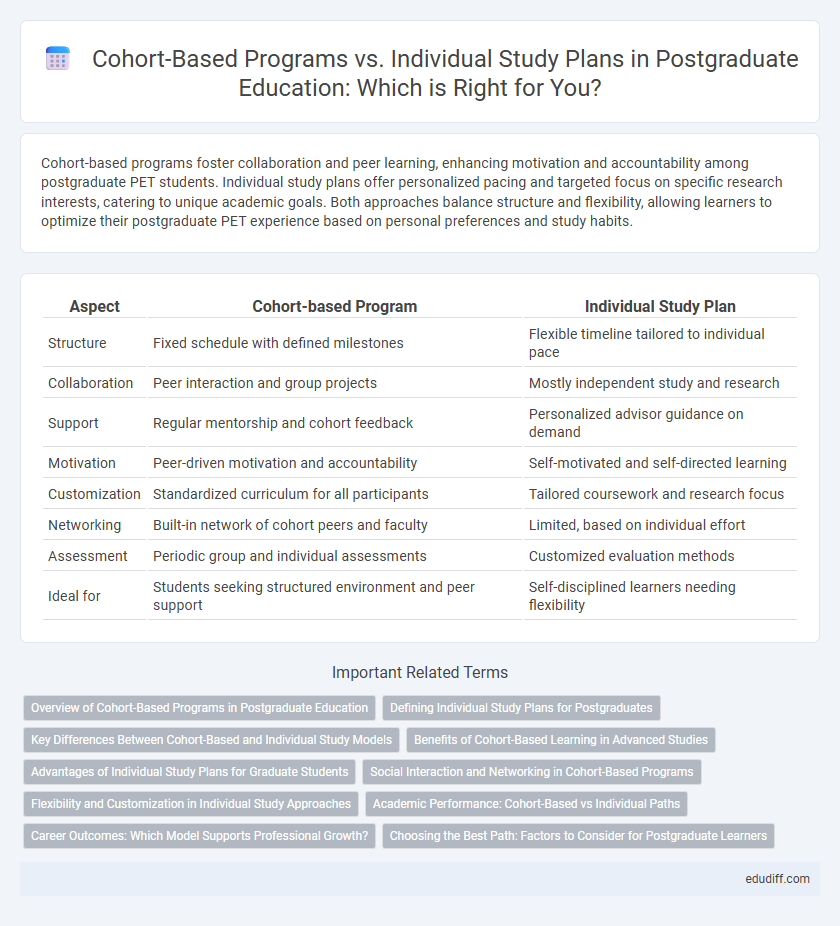Cohort-based programs foster collaboration and peer learning, enhancing motivation and accountability among postgraduate PET students. Individual study plans offer personalized pacing and targeted focus on specific research interests, catering to unique academic goals. Both approaches balance structure and flexibility, allowing learners to optimize their postgraduate PET experience based on personal preferences and study habits.
Table of Comparison
| Aspect | Cohort-based Program | Individual Study Plan |
|---|---|---|
| Structure | Fixed schedule with defined milestones | Flexible timeline tailored to individual pace |
| Collaboration | Peer interaction and group projects | Mostly independent study and research |
| Support | Regular mentorship and cohort feedback | Personalized advisor guidance on demand |
| Motivation | Peer-driven motivation and accountability | Self-motivated and self-directed learning |
| Customization | Standardized curriculum for all participants | Tailored coursework and research focus |
| Networking | Built-in network of cohort peers and faculty | Limited, based on individual effort |
| Assessment | Periodic group and individual assessments | Customized evaluation methods |
| Ideal for | Students seeking structured environment and peer support | Self-disciplined learners needing flexibility |
Overview of Cohort-Based Programs in Postgraduate Education
Cohort-based programs in postgraduate education structure learning around a fixed group of students progressing through the curriculum together, fostering collaboration and peer support. This approach enhances networking opportunities and cultivates collective problem-solving skills essential for advanced academic and professional development. Universities offering cohort models often report higher retention and completion rates, reflecting the motivational benefits of shared educational experiences.
Defining Individual Study Plans for Postgraduates
Individual Study Plans for postgraduates offer tailored academic pathways that align with specific research interests, allowing for focused skill acquisition and personalized milestones. This approach enhances engagement by facilitating targeted mentorship and flexible scheduling, which are critical for advanced research and professional development. Unlike cohort-based programs, Individual Study Plans prioritize independent learning trajectories and custom evaluations, optimizing outcomes for specialized postgraduate fields.
Key Differences Between Cohort-Based and Individual Study Models
Cohort-based programs foster collaborative learning through structured group interactions and synchronized timelines, enhancing peer support and accountability. Individual study plans provide personalized pacing and tailored content, allowing learners to focus on specific goals and adapt to their unique schedules. The key difference lies in the collective engagement and fixed progression of cohorts versus the flexible, self-directed approach of individual models.
Benefits of Cohort-Based Learning in Advanced Studies
Cohort-based programs in postgraduate studies foster collaborative learning environments that enhance critical thinking and problem-solving skills through peer interaction and group discussions. This structured format promotes accountability and motivation, leading to higher completion rates compared to individual study plans. Access to diverse perspectives and immediate feedback accelerates knowledge retention and application in advanced academic and professional contexts.
Advantages of Individual Study Plans for Graduate Students
Individual Study Plans (ISPs) offer graduate students personalized learning trajectories tailored to their unique academic goals and research interests, fostering deeper subject mastery. ISPs enhance time management flexibility by allowing students to progress at their own pace while aligning coursework with thesis deadlines and professional development needs. This customization supports interdisciplinary exploration and collaboration opportunities, ultimately increasing academic success and career readiness.
Social Interaction and Networking in Cohort-Based Programs
Cohort-based programs foster dynamic social interaction and networking opportunities by grouping postgraduate students who progress through their curriculum together, enhancing collaboration and peer support. These structured connections build professional networks and facilitate knowledge exchange, crucial for academic and career advancement. Individual study plans often lack these social frameworks, limiting spontaneous engagement and the development of long-term professional relationships.
Flexibility and Customization in Individual Study Approaches
Individual study plans in postgraduate programs offer unparalleled flexibility, allowing students to tailor their learning schedules and course selections to fit personal commitments and career goals. Unlike cohort-based programs, which follow a fixed curriculum and synchronized timeline, individual plans enable customization of subjects, pacing, and research focus areas. This personalized approach enhances learner autonomy, promotes specialized skill development, and supports diverse academic and professional aspirations.
Academic Performance: Cohort-Based vs Individual Paths
Cohort-based programs enhance academic performance through structured peer collaboration, fostering motivation and accountability among postgraduate students. Individual study plans offer personalized pacing and flexibility, benefiting those with specific learning goals or external commitments. Research indicates that cohort models often yield higher retention rates and improved learning outcomes due to collective engagement and consistent support.
Career Outcomes: Which Model Supports Professional Growth?
Cohort-based programs foster collaborative learning and networking opportunities, accelerating skill development and enhancing professional connections that lead to improved career prospects. Individual study plans offer personalized skill-building aligned with specific career goals, providing flexibility but potentially limiting peer interaction and immediate feedback. Research indicates that cohort-based models often result in higher employment rates and career advancement due to structured support and community engagement.
Choosing the Best Path: Factors to Consider for Postgraduate Learners
Choosing between a cohort-based program and an individual study plan requires postgraduate learners to assess factors such as collaboration opportunities, personalized learning pace, and curriculum flexibility. Cohort-based programs offer structured networking, peer support, and scheduled milestones, fostering accountability and group engagement crucial for disciplines emphasizing teamwork. Individual study plans provide tailored schedules and focused content, ideal for self-motivated learners balancing professional commitments or pursuing specialized research interests.
Cohort-based Program vs Individual Study Plan Infographic

 edudiff.com
edudiff.com